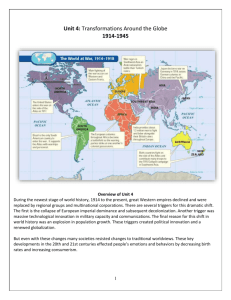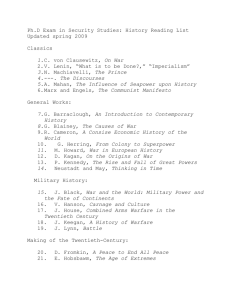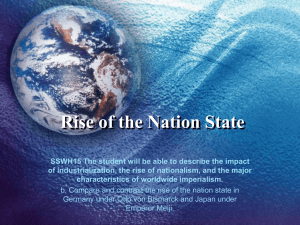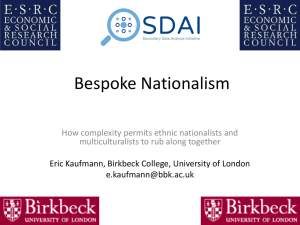Nationalism, Citizenship, and Democracy in Modern Japan
advertisement
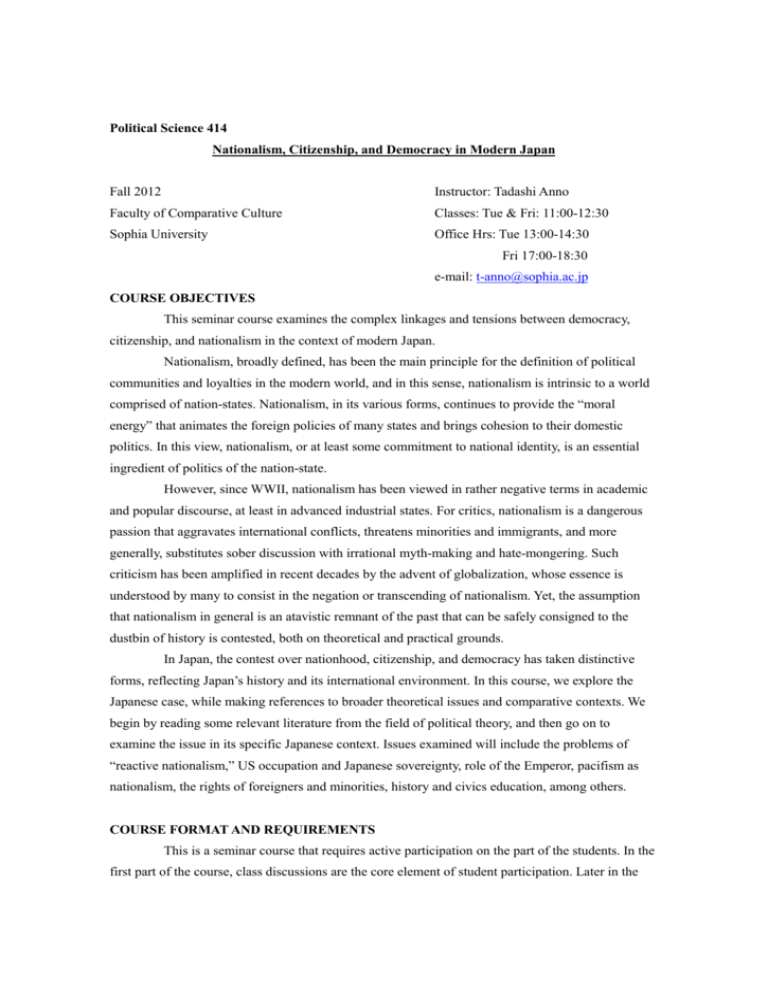
Political Science 414 Nationalism, Citizenship, and Democracy in Modern Japan Fall 2012 Instructor: Tadashi Anno Faculty of Comparative Culture Classes: Tue & Fri: 11:00-12:30 Sophia University Office Hrs: Tue 13:00-14:30 Fri 17:00-18:30 e-mail: t-anno@sophia.ac.jp COURSE OBJECTIVES This seminar course examines the complex linkages and tensions between democracy, citizenship, and nationalism in the context of modern Japan. Nationalism, broadly defined, has been the main principle for the definition of political communities and loyalties in the modern world, and in this sense, nationalism is intrinsic to a world comprised of nation-states. Nationalism, in its various forms, continues to provide the “moral energy” that animates the foreign policies of many states and brings cohesion to their domestic politics. In this view, nationalism, or at least some commitment to national identity, is an essential ingredient of politics of the nation-state. However, since WWII, nationalism has been viewed in rather negative terms in academic and popular discourse, at least in advanced industrial states. For critics, nationalism is a dangerous passion that aggravates international conflicts, threatens minorities and immigrants, and more generally, substitutes sober discussion with irrational myth-making and hate-mongering. Such criticism has been amplified in recent decades by the advent of globalization, whose essence is understood by many to consist in the negation or transcending of nationalism. Yet, the assumption that nationalism in general is an atavistic remnant of the past that can be safely consigned to the dustbin of history is contested, both on theoretical and practical grounds. In Japan, the contest over nationhood, citizenship, and democracy has taken distinctive forms, reflecting Japan’s history and its international environment. In this course, we explore the Japanese case, while making references to broader theoretical issues and comparative contexts. We begin by reading some relevant literature from the field of political theory, and then go on to examine the issue in its specific Japanese context. Issues examined will include the problems of “reactive nationalism,” US occupation and Japanese sovereignty, role of the Emperor, pacifism as nationalism, the rights of foreigners and minorities, history and civics education, among others. COURSE FORMAT AND REQUIREMENTS This is a seminar course that requires active participation on the part of the students. In the first part of the course, class discussions are the core element of student participation. Later in the course, students are encouraged to undertake their own research projects, based on topics suggested by the instructor. In addition to readings and regular participation in discussion, the formal requirements for the course include: 1) attendance; 2) a short (5-8 pages) paper stating your view on the theoretical literature that we read for the class; 3) one [or two] in-class presentation(s) on the assigned readings; 4) one in-class presentation on your research topic, and 5) a final paper (10-15 pages). While there is no formal prerequisite for the course, students taking this course should ideally have at least one of the following: a) background in modern Japanese history or Japanese politics; b) background in political theory or philosophy; c) background in comparative politics. In addition, a reading knowledge of Japanese is highly useful, though students without Japanese language ability are welcome to take this course. COURSE SCHEDULE AND READINGS (Topics and readings are subject to change) Introduction – Left and Right in Contemporary Japanese Politics (2 sessions) Takahashi Tetsuya, “Japan’s Neo-Nationalism: A Critique of Kato Norihiro’s After the Defeat Discourse” in Richard F. Calichman, ed. Contemporary Japanese Thought (Columbia UP, 2005), pp. 193-208 佐伯啓思、 「現代日本のリベラリズム」(講談社、1996 年)、168‐274 頁 or “The Mirage of Japanese Nationalism,” entry in “Anpontan’s Blog” http://ampontan.wordpress.com/2007/05/19/the-mirage-of-japanese-nationalism-1/ Read the entry and responses to it… I: Theoretical Perspectives --Democracy, Civic Virtues, and Nationalism (4 sessions) 1) Democracy and Citizenship (1 session) Will Kymlicka & Wayne Norman, “Return of the Citizen: A Survey of Recent Work on Citizenship Theory,” in Ronald Beiner, ed., Theorizing Citizenship (SUNY Press, 1995), pp. 283-322. Michael Sandel, Democracy’s Discontent: America in Search of a Public Philosophy, (Belknap Press, 1996), pp. 3-24. 2) Nationalism and Civil Religion (2 sessions) Roger Scruton, “In Defense of the Nation,” in Scruton, The Philosopher on Dover Beach (Manchester: Carcanet, 1990), pp. 299-329 Bikhu Parekh, “The Inconsistency of Nationalism,” in Ronald Beiner, ed., Theorizing Nationalism (SUNY Press, 1999), pp. 295-325. Martha C. Nussbaum, For Love of Country (Boston: Beacon Press, 1996), Excerpts J.J. Rousseau, The Social Contract, Section on “Civil Religion” Yael Tamir, Liberal Nationalism (Princeton UP, 1993), pp. 3-12, 117-167. 3) Postmaterialism or Civic Disengagement (1 session) Ronald Inglehart, Modernization and Postmodernization: Cultural, Economic, and Political Change in 43 Societies (Princeton UP, 1997), pp. 3-50. Robert Putnam, “Bowling Alone,” Journal of Democracy, Vol. 6, No. 1 (January 1995), pp. 65-78. http://xroads.virginia.edu/~HYPER/DETOC/assoc/bowling.html II: Historical Perspectives on Japanese Nationalism 1) Historical Background (5 sessions) a) Reactive nationalism (2 sessions) Marius Jansen, “On Foreign Borrowing,” in Albert M. Craig, ed., Japan: A Comparative View (Princeton UP, 1979), pp. 18-48. Irwin Scheiner, Modern Japan: An Interpretive Anthology (New York: Macmillan, 1974), Essays by Sato, Maruyama, Pyle, and Matsumoto Sukehiro Hirakawa, Japan’s Love-Hate Relationship with the West (Dorset, UK: Global Oriental, 2004), pages TBA Tadashi Anno, “The Liberal World Order and Its Challengers: Nationalism and the Rise of Anti-Systemic Movements in Russia and Japan, 1860-1950” (Ph.D. Diss., UC Berkeley, 1999), pp. 263-411. b) Emperor and nationhood (1 session) Kevin M. Doak, A History of Modern Japanese Nationalism (Leiden: Brill, 2007), pp. 36-163. Kenneth Ruoff, People’s Emperor: Democracy and the Japanese Monarchy, 1945-1995 (Harvard UP, 2003), Chapter 1. c) Prewar constitutionalism (1 session) Lawrence W. Beer and John M. Maki, From Imperial Myth to Democracy: Japan’s Two Constitutions, 1889-2002 (University Press of Colorado, 2002), Chaps. 1-2 d) Nation-building and empire-building (1 session) Eiji Oguma A Genealogy of Japan’s Self-Images (Melbourne, Trans Pacific Press, 2002), Excerpts 2) Nationalism, Citizenship, and Democracy in the Postwar Era (12 sessions) a) Constitution and the issue of Japanese sovereignty (3 sessions) John Dower, Embracing Defeat: Japan in the Wake of World War Two (New York: Norton, 2000), selected chapters. Beer and Maki, From Imperial Myth to Democracy, Chaps. 3-4. Kyoko Inoue, MacArthur’s Japanese Constitution (Chicago UP, 1991), excerpts Glenn Hook and Gavan McCormack, Japan’s Contested Constitution (London: Routledge, 2001), excerpts Sakamoto Takao, Shocho tennosei to nihon no raireki (Tokyo, Toshi shuppan, 1999) (The Symbolic Emperor System and Japan’s Self-Narrative) (excerpted translation from a Japanese text provided by the instructor) b) Emperor and the popular sovereignty (2 sessions) Kenneth Ruoff, People’s Emperor, excerpts Sakamoto, Shocho tennosei, excerpts. c) Pacifism and/as nationalism (2 sessions) Oguma Eiji, Minshu to aikoku, (Tokyo, Shin’yosha, 2002) (Democracy and Patriotism), (excerpted translation to be provided by the instructor) James Joseph Orr, Victims as Hero: Ideologies of Peace and National Identity in Postwar Japan (University of Hawaii Press, 2001) d) Foreigners and Minorities (2 sessions) Apichai W. Shipper, Fighting for Foreigners: Immigration and Its Impact on Japanese Democracy (Cornell UP, 2008), pages TBA. Michael Weiner, ed., Japan’s Minorities: Illusion of Homogeneity, 2nd ed. (London: Routledge, 2008), selected chapters e) History/ Civics Teaching in Japan (3 sessions) Censoring History: Citizenship and Memory in Japan, Germany, and the United States (Armonk, NY: M.E. Sharpe, 2001) Sakamoto Takao, Rekishi kyoiku to wa nani ka (Tokyo: Bungei shunju, 1998) (What is History Education?) excerpted translation to be provided by the instructor. Shin Gi-Wook and Daniel Sneider, eds., History Textbook and the Wars in Asia: Divided Memories Bruce Haynes, ed., Patriotism and Citizenship Education (Chichester, West Sussex: Wiley-Blackwell, 2010) III: Student Presentations (3 sessions)
![“The Progress of invention is really a threat [to monarchy]. Whenever](http://s2.studylib.net/store/data/005328855_1-dcf2226918c1b7efad661cb19485529d-300x300.png)



